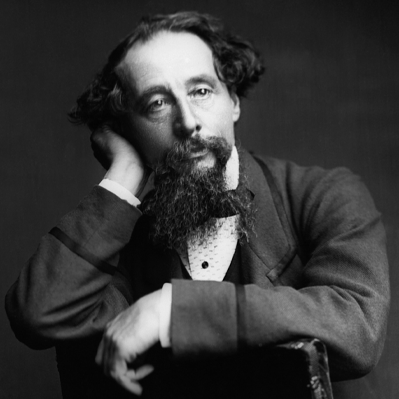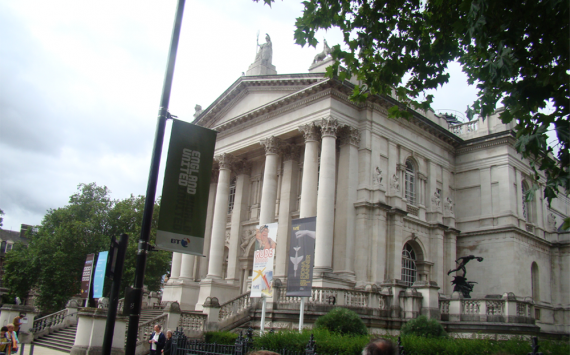- 1. Early life

DICKENS
Charles
English writer
Date of Birth: 7 February 1812
Date death: 9 June 1870
Age at the time of death: 58 years old
Zodiac sign: Aquarius
Profession: Writer
Biography
Charles John Huffam Dickens was an English writer and social critic. He created some of the world's best-known fictional characters and is regarded by many as the greatest novelist of the Victorian era. His works enjoyed unprecedented popularity during his lifetime and, by the 20th century, critics and scholars had recognised him as a literary genius. His novels and short stories are widely read today.
Born in Portsmouth, Dickens left school at the age of 12 to work in a boot-blacking factory when his father was incarcerated in a debtors' prison. After three years he returned to school, before he began his literary career as a journalist. Dickens edited a weekly journal for 20 years, wrote 15 novels, five novellas, hundreds of short stories and non-fiction articles, lectured and performed readings extensively, was an indefatigable letter writer, and campaigned vigorously for children's rights, for education, and for other social reforms.
Dickens's literary success began with the 1836 serial publication of The Pickwick Papers, a publishing phenomenon—thanks largely to the introduction of the character Sam Weller in the fourth episode—that sparked Pickwick merchandise and spin-offs. Within a few years Dickens had become an international literary celebrity, famous for his humour, satire and keen observation of character and society. His novels, most of them published in monthly or weekly instalments, pioneered the serial publication of narrative fiction, which became the dominant Victorian mode for novel publication. Cliffhanger endings in his serial publications kept readers in suspense. The instalment format allowed Dickens to evaluate his audience's reaction, and he often modified his plot and character development based on such feedback. For example, when his wife's chiropodist expressed distress at the way Miss Mowcher in David Copperfield seemed to reflect her own disabilities, Dickens improved the character with positive features. His plots were carefully constructed and he often wove elements from topical events into his narratives. Masses of the illiterate poor would individually pay a halfpenny to have each new monthly episode read to them, opening up and inspiring a new class of readers.
His 1843 novella A Christmas Carol remains especially popular and continues to inspire adaptations in every artistic genre. Oliver Twist and Great Expectations are also frequently adapted and, like many of his novels, evoke images of early Victorian London. His 1859 novel A Tale of Two Cities (set in London and Paris) is his best-known work of historical fiction. The most famous celebrity of his era, he undertook, in response to public demand, a series of public reading tours in the later part of his career. The term Dickensian is used to describe something that is reminiscent of Dickens and his writings, such as poor social or working conditions, or comically repulsive characters.
Early life
Charles John Huffam Dickens was born on 7 February 1812 at 1 Mile End Terrace (now 393 Commercial Road), Landport in Portsea Island (Portsmouth), Hampshire, the second of eight children of Elizabeth Dickens (née Barrow; 1789–1863) and John Dickens (1785–1851). His father was a clerk in the Navy Pay Office and was temporarily stationed in the district. He asked Christopher Huffam, rigger to His Majesty's Navy, gentleman, and head of an established firm, to act as godfather to Charles. Huffam is thought to be the inspiration for Paul Dombey, the owner of a shipping company in Dickens's novel Dombey and Son (1848).
In January 1815, John Dickens was called back to London and the family moved to Norfolk Street, Fitzrovia. When Charles was four, they relocated to Sheerness and thence to Chatham, Kent, where he spent his formative years until the age of 11. His early life seems to have been idyllic, though he thought himself a "very small and not-over-particularly-taken-care-of boy".
Charles spent time outdoors, but also read voraciously, including the picaresque novels of Tobias Smollett and Henry Fielding, as well as Robinson Crusoe and Gil Blas. He read and reread The Arabian Nights and the Collected Farces of Elizabeth Inchbald. At age 7 he first saw Joseph Grimaldi—the father of modern clowning—perform at the Star Theatre, Rochester. He later imitated Grimaldi's clowning on several occasions, and would also edit the Memoirs of Joseph Grimaldi. He retained poignant memories of childhood, helped by an excellent memory of people and events, which he used in his writing. His father's brief work as a clerk in the Navy Pay Office afforded him a few years of private education, first at a dame school and then at a school run by William Giles, a dissenter, in Chatham.
This period came to an end in June 1822, when John Dickens was recalled to Navy Pay Office headquarters at Somerset House and the family (except for Charles, who stayed behind to finish his final term at school) moved to Camden Town in London. The family had left Kent amidst rapidly mounting debts and, living beyond his means,[26] John Dickens was forced by his creditors into the Marshalsea debtors' prison in Southwark, London in 1824. His wife and youngest children joined him there, as was the practice at the time. Charles, then 12 years old, boarded with Elizabeth Roylance, a family friend, at 112 College Place, Camden Town. Mrs Roylance was "a reduced impoverished old lady, long known to our family", whom Dickens later immortalised, "with a few alterations and embellishments", as "Mrs Pipchin" in Dombey and Son. Later, he lived in a back-attic in the house of an agent for the Insolvent Court, Archibald Russell, "a fat, good-natured, kind old gentleman ... with a quiet old wife" and lame son, in Lant Street in Southwark. They provided the inspiration for the Garlands in The Old Curiosity Shop.
On Sundays – with his sister Frances, free from her studies at the Royal Academy of Music – he spent the day at the Marshalsea. Dickens later used the prison as a setting in Little Dorrit. To pay for his board and to help his family, Dickens was forced to leave school and work ten-hour days at Warren's Blacking Warehouse, on Hungerford Stairs, near the present Charing Cross railway station, where he earned six shillings a week pasting labels on pots of boot blacking. The strenuous and often harsh working conditions made a lasting impression on Dickens and later influenced his fiction and essays, becoming the foundation of his interest in the reform of socio-economic and labour conditions, the rigours of which he believed were unfairly borne by the poor. He later wrote that he wondered "how I could have been so easily cast away at such an age". As he recalled to John Forster (from Life of Charles Dickens):
The blacking-warehouse was the last house on the left-hand side of the way, at old Hungerford Stairs. It was a crazy, tumble-down old house, abutting of course on the river, and literally overrun with rats. Its wainscoted rooms, and its rotten floors and staircase, and the old grey rats swarming down in the cellars, and the sound of their squeaking and scuffling coming up the stairs at all times, and the dirt and decay of the place, rise up visibly before me, as if I were there again. The counting-house was on the first floor, looking over the coal-barges and the river. There was a recess in it, in which I was to sit and work. My work was to cover the pots of paste-blacking; first with a piece of oil-paper, and then with a piece of blue paper; to tie them round with a string; and then to clip the paper close and neat, all round, until it looked as smart as a pot of ointment from an apothecary's shop. When a certain number of grosses of pots had attained this pitch of perfection, I was to paste on each a printed label, and then go on again with more pots. Two or three other boys were kept at similar duty down-stairs on similar wages. One of them came up, in a ragged apron and a paper cap, on the first Monday morning, to show me the trick of using the string and tying the knot. His name was Bob Fagin; and I took the liberty of using his name, long afterwards, in Oliver Twist.
When the warehouse was moved to Chandos Street in the smart, busy district of Covent Garden, the boys worked in a room in which the window gave onto the street. Small audiences gathered and watched them at work – in Dickens's biographer Simon Callow's estimation, the public display was "a new refinement added to his misery".
A few months after his imprisonment, John Dickens's mother, Elizabeth Dickens, died and bequeathed him £450. On the expectation of this legacy, Dickens was released from prison. Under the Insolvent Debtors Act, Dickens arranged for payment of his creditors and he and his family left the Marshalsea, for the home of Mrs Roylance.
Charles's mother, Elizabeth Dickens, did not immediately support his removal from the boot-blacking warehouse. This influenced Dickens's view that a father should rule the family and a mother find her proper sphere inside the home: "I never afterwards forgot, I never shall forget, I never can forget, that my mother was warm for my being sent back." His mother's failure to request his return was a factor in his dissatisfied attitude towards women.
Righteous indignation stemming from his own situation and the conditions under which working-class people lived became major themes of his works, and it was this unhappy period in his youth to which he alluded in his favourite, and most autobiographical, novel, David Copperfield: "I had no advice, no counsel, no encouragement, no consolation, no assistance, no support, of any kind, from anyone, that I can call to mind, as I hope to go to heaven!"
Dickens was eventually sent to the Wellington House Academy in Camden Town, where he remained until March 1827, having spent about two years there. He did not consider it to be a good school: "Much of the haphazard, desultory teaching, poor discipline punctuated by the headmaster's sadistic brutality, the seedy ushers and general run-down atmosphere, are embodied in Mr Creakle's Establishment in David Copperfield."
Dickens worked at the law office of Ellis and Blackmore, attorneys, of Holborn Court, Gray's Inn, as a junior clerk from May 1827 to November 1828. He was a gifted mimic and impersonated those around him: clients, lawyers and clerks. He went to theatres obsessively: he claimed that for at least three years he went to the theatre every day. His favourite actor was Charles Mathews and Dickens learnt his "monopolylogues" (farces in which Mathews played every character) by heart. Then, having learned Gurney's system of shorthand in his spare time, he left to become a freelance reporter. A distant relative, Thomas Charlton, was a freelance reporter at Doctors' Commons and Dickens was able to share his box there to report the legal proceedings for nearly four years. This education was to inform works such as Nicholas Nickleby, Dombey and Son and especially Bleak House, whose vivid portrayal of the machinations and bureaucracy of the legal system did much to enlighten the general public and served as a vehicle for dissemination of Dickens's own views regarding, particularly, the heavy burden on the poor who were forced by circumstances to "go to law".
In 1830, Dickens met his first love, Maria Beadnell, thought to have been the model for the character Dora in David Copperfield. Maria's parents disapproved of the courtship and ended the relationship by sending her to school in Paris.
Born in one day
.
Horoscope Aquarius: horoscope for today, horoscope for tomorrow, horoscope for week, horoscope for month, horoscope for year.











































